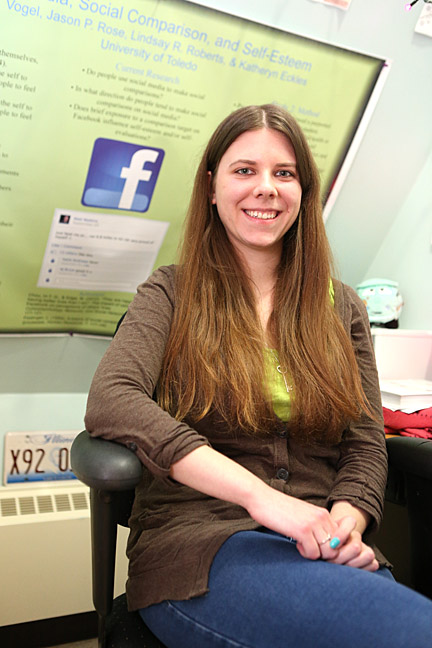Does the number of likes on Facebook affect how much you like yourself? A recent study was published by a University of Toledo graduate student on an experiment exploring the effects social media has on self-esteem.

Erin Vogel led an experiement to see how Facebook affects self-esteem; the study was published in Psychology of Popular Media Culture.
She worked with graduate student Lindsay Roberts and 2013 graduate Katie Eckles to conduct the experiment in spring 2013. Vogel, Roberts and Eckles were students of Dr. Jason Rose, UT associate professor of psychology, who encouraged the collaboration.
“It started when we were talking about social comparisons,” Vogel said. “We started talking about Facebook because it’s relatively new and it’s a really rich source of social information for people. They can get all sorts of information about people they barely know — their daily habits, their activities, all sorts of things about their lives.”
Vogel said the experiment was divided into two separate studies. In the first one, they surveyed people about their self-esteem, social media habits, and how much they felt they compare themselves to others. For the second study, she said they created fake Facebook profiles and showed them to students, saying they belonged to other UT students.
The profiles varied based on whether they conveyed an upward comparison target, or someone with desirable characteristics, or a downward comparison target, or someone with undesirable characteristics.
Vogel explained they created upward comparisons by making the fake profiles depict students who had very desirable characteristics, such as being very fit and healthy and receiving social support from their Facebook friends and family in the form of virtual likes and comments. On the other hand, they created downward comparison targets by making the profiles depict students who had undesirable characteristics, such as a sedentary lifestyle and the lack of social support from family and friends.
Once they finished viewing the fake profiles, students’ self-esteem was measured in two ways: trait self-esteem, the way one generally feels about or evaluates himself or herself, and state self-esteem, how one feels about or evaluates herself or himself at a given point. Vogel said trait self-esteem was used to measure the effects Facebook has on long-term self-esteem, and state self-esteem to measure how people feel about themselves while they were actually viewing the profiles.
“In study one, it was observed that people who use Facebook most frequently tended to have lower trait self-esteem,” Rose said. “So they have this lower chronic, stable self-esteem and that tended to be because of the fact that Facebook involves so many of the upward social comparisons — comparing ourselves to people who are doing great things, who we think are better than us on some dimension.”
Rose said even temporary exposure to Facebook profiles with an upward comparison target, like the ones viewed in the second phase of the study, affected self-esteem — particularly state self-esteem.
Vogel, who is in her third year of graduate school, said she plans to look for research positions at a university after she graduates. Eventually, she would like to apply for a faculty position. Getting this paper published will boost her opportunities, she said.
“It’s my first publication, so I’m really excited about it,” she said. “It’s definitely important to have a good publication record for getting a job. It’s given me a lot of insight into the peer-review process and just the entire process from start to finish from coming up with an idea to getting it published.”
Vogel is conducting further studies about social comparisons on social media.